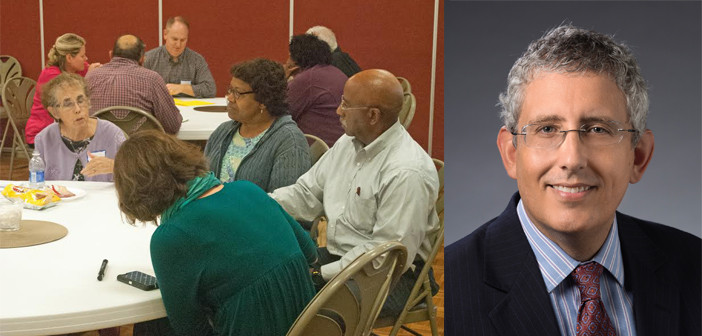Keck: Communities will benefit
By Scott Robertson
The tenth and final scheduled community forum seeking input into the proposed merger of Mountain States Health Alliance and Wellmont Health System was held Thursday evening at the Memorial Park Community Center in Johnson City with a sparse crowd in attendance.
The dozen or so attendees were given the opportunity to talk with moderators in a world café formatted discussion after hearing from Dr. Randy Wykoff, ETSU Dean of Public Health and Tony Keck, MSHA senior vice president and chief development officer.
Wykoff talked about improving the quality of health, and not just health care, in a region that ranks behind one of the lowest rated states (Tennessee, at 47th) in the 33rd rated nation (the United States) in early death rates. Wykoff mentioned factors from genetics to behaviors, but also talked a good bit about the socio-economic determinants of health in populations.
Keck discussed the state of the merger effort, including the concept of an accountable care community, and outgrowth of the accountable care organization mindset. “It stems from an idea that the majority of the health of an individual and a community is not determined by healthcare services per se, but by income and education and social support and environment.
“What we’ve been doing in the United States for a long time is putting all our money and effort into healthcare services believing that it is what we need to do to make people healthier,” Keck continued.
“In reality we have come to the realization and years of research support it that if we’re really going to improve the health of, for instance, our region, we need a broad group of individuals and organizations that represent all those social determinants such as education, law enforcement, housing, healthcare providers and government, to get around the table, set some common goals and then all do their part in their unique way to actually move the region towards those goals.”
The key is to have broad buy-in to the concept of making the community healthier, Keck said. That will allow coordination of efforts. “So if we’re trying to reduce heart disease in a community, certainly one thing a provider like us can do is reach out and do more screenings for heart disease, but something that other employers might do is prohibit smoking in the workplace. Schools might get involved by running programs to keep kids and teens from starting smoking in the first place. The city government or county government with the parks department might create more greenspace for people to get outside. The roads department might make it easier for people to walk as opposed to just drive.
When you layer all these things on top of one another in a concerted effort, there’s evidence that you can make real progress in a community.”
The trick, Keck said, is in getting the buy-in from the people and organizations who can bring the resources to bear. “Policy is just someone’s great idea or great opinion unless you’re actually able to execute it. I think in the past some of the things where people have tried to get together to make these efforts work, they’ve failed for a couple of reasons. One is because it does take a lot of skill to get people in a room and get them all to agree to move in a certain direction. I think over time there’ve been more and more lessons learned, either successful efforts or failures where people have been able to look toward this and say hey if we’re going to try to do this, here’s the right way to do it.”
And from that, at least in Virginia, Keck said, there’s already an effort to incent the players. “The state government as part of their innovation model health reform grant, is going to help communities in Virginia set up accountable care communities. They’ll bring technical assistance of how you should do it along with sustainable funding.
It’s hard to make these things go on volunteer steam alone and so they’ll bring some infrastructure and some resources to the plate.
The newly merged Mountain States – Wellmont company will follow that model in taking the lead on building accountable care communities in its service area, Keck said. “I think the thing that’s really exciting about the merger is that you’ll have the technical assistance, you’ll have the resources to help staff these efforts, but through the merger we’re going to make dollars available to actually help fund programs in a sustainable way. Many times because of the way dollars flow from the state government, the federal government, the local government or through businesses, it can be hard to weave those dollars together. We’re hoping to be able to catalyze some of that so that when we do get around the table and we do agree on certain goals and we do agree on maybe what some evidenced-based practices are to reach those goals, we’ll actually have a sustainable stream of funding to actually help pursue those.”
The process of holding the ten public meetings regarding the merger has identified more than 140 individuals and organizations throughout Northeast Tennessee and Southwest Virginia that can play a role in coordinating resources, Keck said.
“There’ll be lots of bumps in the road and lots of learning as we go forward and work together,” Keck cautioned, “but I think we’ve got a good foundation of people and organizations and experience that can help us get it set up.”




